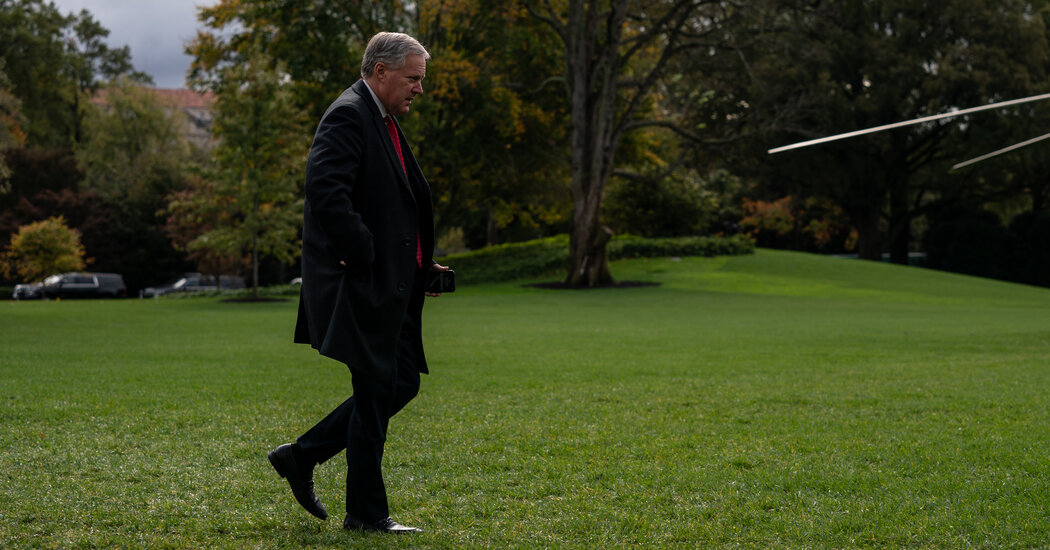WASHINGTON — Mark Meadows, the former White House chief of staff under President Donald J. Trump, has reached an agreement with the House committee
WASHINGTON — Mark Meadows, the former White House chief of staff under President Donald J. Trump, has reached an agreement with the House committee investigating the Jan. 6 attack on the Capitol to provide documents and sit for a deposition, the committee said Tuesday, a stunning reversal for a crucial witness in the inquiry.
The change of stance for Mr. Meadows, who had previously refused to cooperate with the committee in line with a directive from Mr. Trump, came as the panel prepared to seek criminal contempt of Congress charges against a second witness who has stonewalled its subpoenas. It marked a turnabout after weeks of private wrangling between the former chief of staff and the select committee over whether he would participate in the investigation, and to what degree.
“Mr. Meadows has been engaging with the select committee through his attorney,” Representative Bennie G. Thompson, Democrat of Mississippi and chairman of the panel, said in a statement. “He has produced records to the committee and will soon appear for an initial deposition.”
Mr. Thompson indicated that he was withholding judgment about whether Mr. Meadows was willing to cooperate sufficiently, adding, “The committee will continue to assess his degree of compliance with our subpoena after the deposition.”
CNN earlier reported that Mr. Meadows’s had reached a deal with the inquiry.
Citing a claim of executing privilege from Mr. Trump, Mr. Meadows’s lawyer, George J. Terwilliger III, wrote to the committee on Nov. 10 saying that his client could not “in good conscience” provide testimony out of an “appreciation for our constitutional system and the separation of powers,” asserting that doing so would “undermine the office and all who hold it.”
That stance was condemned by the leaders of the committee, Mr. Thompson and Representative Liz Cheney, Republican of Wyoming and the vice chairwoman, who accused Mr. Meadows of defying a lawful subpoena. They said they would consider pursuing contempt charges to enforce it.
Mr. Thompson and Ms. Cheney called Mr. Trump’s privilege claims “spurious,” and added that many of the matters they wished to discuss with Mr. Meadows “are not even conceivably subject to any privilege claim, even if there were one.”
Among their questions, they said, were whether he was using a private cellphone to communicate on Jan. 6 and the location of his text messages from that day.
On Tuesday, Mr. Terwilliger, who has argued that senior White House aides must not be compelled to testify before Congress, told CNN that he had worked with the select committee to find a way for Mr. Meadows to cooperate that would be entirely voluntary and did not require him to waive executive privilege.
He said Mr. Meadows would provide “voluntary responses on non-privileged topics.”
The select committee issued a subpoena for Mr. Meadows’s records and testimony in September, citing his involvement in the planning of efforts to subvert the results of the 2020 election. In Mr. Trump’s final weeks in office, Mr. Meadows repeatedly pushed the Justice Department to investigate unfounded conspiracy theories, according to emails provided to Congress, portions of which were reviewed by The New York Times. He was also in communication with organizers of the rally on Jan. 6 that preceded the violence, including Amy Kremer of Women for America First, the committee said.
Understand the Claim of Executive Privilege in the Jan. 6. Inquiry
A key issue yet untested. Donald Trump’s power as former president to keep information from his White House secret has become a central issue in the House’s investigation of the Jan. 6 Capitol riot. Amid an attempt by Mr. Trump to keep personal records secret and the indictment of Stephen K. Bannon for contempt of Congress, here’s a breakdown of executive privilege:
The committee on Wednesday is expected to begin contempt of Congress proceedings against Jeffrey Clark, a former Justice Department official involved in Mr. Trump’s effort to upend the election.
The vote would be the second such confrontation between the committee and an ally of Mr. Trump since Congress began investigating the circumstances surrounding the Capitol riot, which resulted in multiple deaths and dozens of injuries.
The House voted in October to recommend that another of Mr. Trump’s associates, Stephen K. Bannon, be charged with criminal contempt of Congress for stonewalling the inquiry.
A federal grand jury subsequently indicted him on two counts that could carry up to two years behind bars in total.
www.nytimes.com
